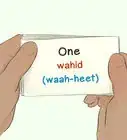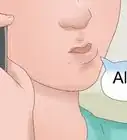This article was co-authored by wikiHow Staff. Our trained team of editors and researchers validate articles for accuracy and comprehensiveness. wikiHow's Content Management Team carefully monitors the work from our editorial staff to ensure that each article is backed by trusted research and meets our high quality standards.
There are 11 references cited in this article, which can be found at the bottom of the page.
This article has been viewed 69,361 times.
Learn more...
Egyptian Arabic is a dialect of Modern Standard Arabic. It uses many of the same words, though it does borrow from other languages as well. It also uses some different pronunciations.[1] If you're trying to learn Egyptian Arabic, start by picking up a few of the basic phrases. Move on to learning some of the basic pronunciation, so you can pronounce what you see. Finally, get some help from educational programs, such as online classes or a language exchange program.
Steps
Learning Basic Phrases in Egyptian Arabic
-
1Say "hello." One way to say "hello" is "is salām 'alaykum." The appropriate response is "wa 'alaykum is salām." You can also say "welcome," which is "ahlan wa sahlan." The response is "ahlan beek." An informal response is "ahlan." For "goodbye," you can say "ma'is salāma" or "bai."[2]
-
2Learn how to say "goodbye." For "goodbye," you can say "ma'is salāma." You can also say "bai" instead, which is close to the English "bye."[3]Advertisement
-
3Ask how much something is. You'll likely need to ask the price of something fairly often. To ask, simply say "bekam da?" which is "How much is this?" and wait for the reply.[4]
-
4Memorize the basic numbers. While you may not be able to memorize 1 to 100 right away, you should start out with 1 to 10 so you at least have a basic understanding. The numbers 1 through 10 are as follows: [5]
- wahed (1)
- etneen (2)
- talata (3)
- arba'a (4)
- khamsa (5)
- setta (6)
- sab'a (7)
- tamania (8)
- tes'a (9)
- ashra (10)
-
5Learn "excuse me." "Excuse me" is a useful phrase. You can use it to get someone's attention or if you want to apologize to someone. The Egyptian Arabic phrase is " 'an iznak" if you're addressing a man, " 'an iznik" if you're addressing a woman, and " 'an izniku" if you're speaking to a group.[6]
-
6Say "Thank you." "Thank you" is obviously a good phrase to know, as you can use it to show gratitude. For "thank you," you can say "shukrān," "mut shakkrān," or "shukrān gazēlan."[7]
-
7Ask "How are you?" This phrase is broken down into different categories, based on who you're speaking to. You say "izzaayak" if you're speaking to a man, "izzaayik?" if you're speaking to a woman, and "izzaayuuku?" if you're speaking to a group.[8]
- To reply "fine," you can say one of the following:
- "kwayyis" if you're a man
- "kwayyesa" if you're a woman
- "kwayyiseen" if you're speaking about a group
- To reply "fine," you can say one of the following:
Figuring out the Basic Pronunciation
-
1Practice your vowel sounds. Start by learning the vowel sounds and accented letters. That will help you figure out how to say the majority of words in Egyptian Arabic.[9]
- For instance, this "ā" is pronounced like the "a" in "father." An "a" with an accent mark (á) usually sounds like the second "a" in "Alabama."
- The basic vowel sounds in Egyptian Arabic are as follows:
- a, pronounced like the vowel in "sat"
- aa, pronounced like the "ar" in "far"
- ay, as in "lay"
- aw, as in the "ow" in "now"
- i, pronounced like the vowels in "set" or "sit"
- ii, like the vowels in "feed"
- oh, as in "boat"
- u, as in "pull"
- uu, as in "boot"[10]
-
2Learn the basics of the consonants. The consonants are not always pronounced as you'd think they would be. Even if they're written written in Latin letters (as opposed to Arabic letters), you can't always guess the correct pronunciation. That's particularly true if the letters have accent marks.[11]
- For instance, "ḥ" is pronounced as a hard "h" sound, while "ḫ" (also kh or x) is pronounced like the German "ch," such as "Bach."
- "T" is a typical "t" sound, but "ṯ" is a "th" sound. Similarly, "S" makes a typical sound, but "š" makes an "sh" sound, while "ṣ" makes the "s" sound in "sold." "J" makes a sound like the "g" in "game," while "ġ" or "gh" makes an "r" sound, such as "Paris."
- These are the main examples of the differences; most of the other Latin letters are pronounced as you would in English.
-
3Learn the Arabic alphabet. While you don't need to learn the alphabet to speak, it helps to know it for pronunciation and to read signs. Egyptian Arabic mostly uses Modern Standard Arabic (MSA) for the written language, so learn the MSA alphabet. You can use online resources to learn the basics of the alphabet.[12]
- Egyptian Arabic is a regional dialect (or actually, several dialects), and there isn't a standardized spelling for it. That's why it usually uses MSA. However, you will see many different spellings when it is written down.
Using Educational Programs
-
1Try online courses. Online courses will help you learn the basics of the language. You can find cheap or free courses all across the internet, especially if you are just starting out in the language. Use an online search tool to find a class that fits your needs.[13]
- For instance, you can try this website: https://egyptianarabic.com/.
-
2Use an app. Another way to learn the language is to use an app on your smartphone. Generally, these apps teach you by turning it into a game, immersing you in the language as you go. Try looking your phone's app store to find an app to use.
- Try Learn Egyptian Arabic Words by Baby Kuma ABC (Japan).
-
3Watch Egyptian television. While you may not be able to find full programs, you should be able to find some videos in Egyptian Arabic online.[14] Watching these videos will help you pick up the language, plus you'll also start learning the body language and gestures that Egyptians use. Try a reputable website such as YouTube to look for basic videos.[15]
-
4Find a language exchange partner. A language exchange partner is someone who speaks the language as a native. You'll help them learn your language, and they'll help you learn Egyptian Arabic. You can find partners through language exchange sites.[16]
References
- ↑ https://egyptianarabic.com/
- ↑ https://www.omniglot.com/language/phrases/arabic_egyptian.php
- ↑ https://www.omniglot.com/language/phrases/arabic_egyptian.php
- ↑ http://learn101.org/egyptian_phrases.php
- ↑ http://learn101.org/egyptian_numbers.php
- ↑ https://www.omniglot.com/language/phrases/arabic_egyptian.php
- ↑ https://www.omniglot.com/language/phrases/arabic_egyptian.php
- ↑ https://egyptianarabic.com/
- ↑ http://mylanguages.org/egyptian_alphabet.php
- ↑ https://books.google.com/books?id=4M5zCgAAQBAJ&pg=PA4&lpg=PA4&dq=egyptian+arabic+vowel+sounds&source=bl&ots=ps6Ay_qR7S&sig=GAoD2KKBvRrcvY_yJG3sAv9MQ9w&hl=en&sa=X&ved=0ahUKEwj95f_8xeXXAhXBw1QKHRtSA9E4ChDoAQhTMAk#v=onepage&q=egyptian%20arabic%20vowel%20sounds&f=false
- ↑ http://mylanguages.org/egyptian_alphabet.php
- ↑ https://omniglot.com/writing/arabic.htm
- ↑ https://egyptianarabic.com/
- ↑ https://omniglot.com/writing/arabic_egypt.htm
- ↑ https://www.youtube.com/watch?v=hkRFPY3dVVY
- ↑ https://www.mylanguageexchange.com/Learn/egyptian.asp
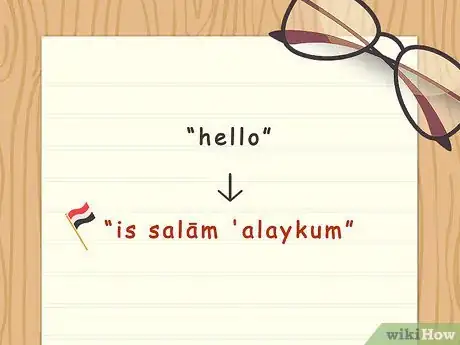
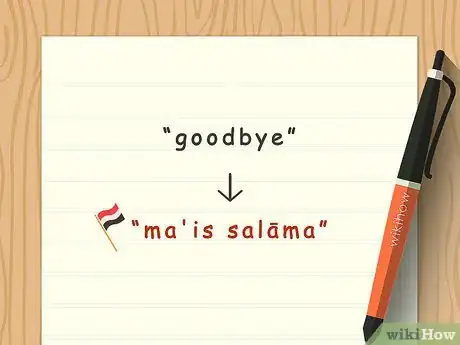
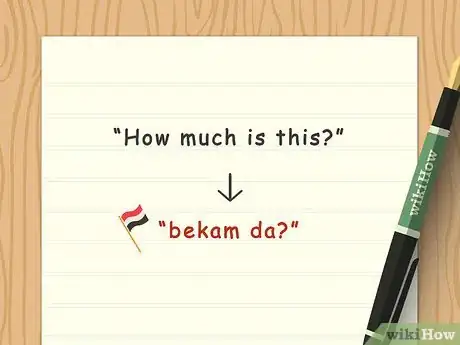
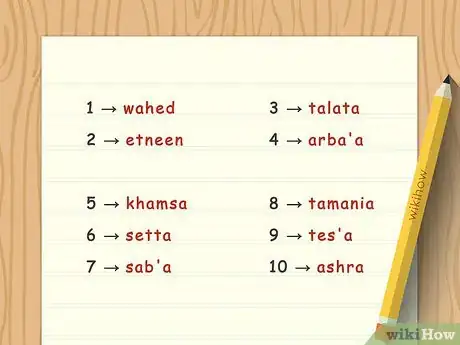
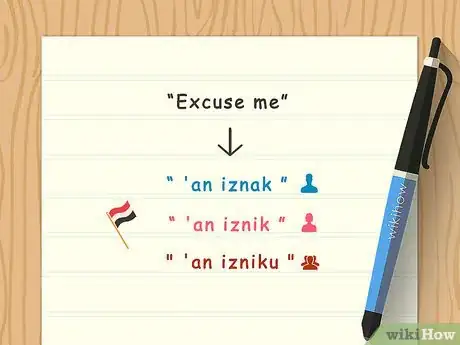
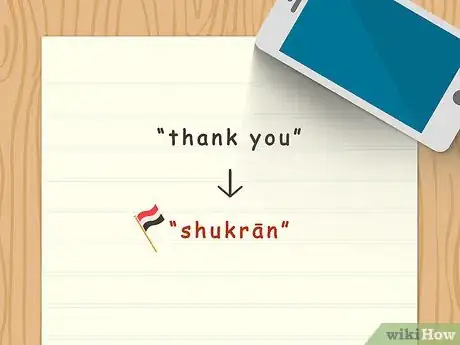
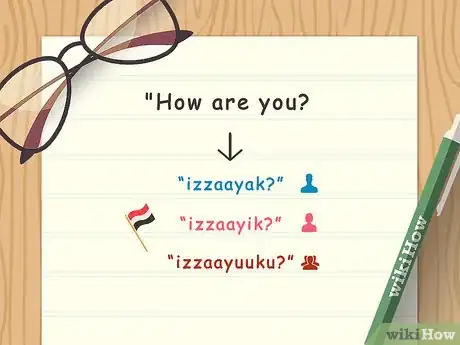
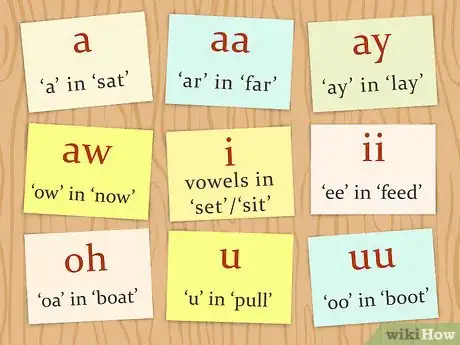
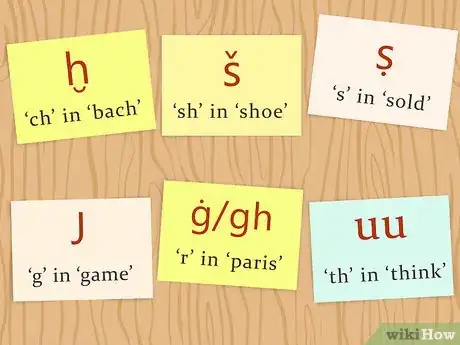
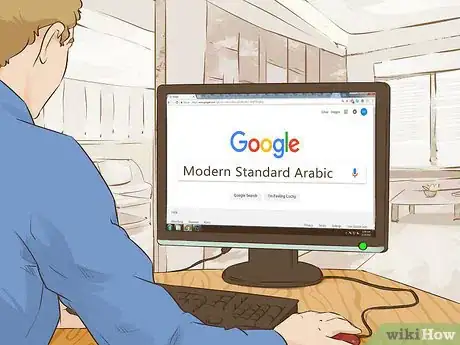
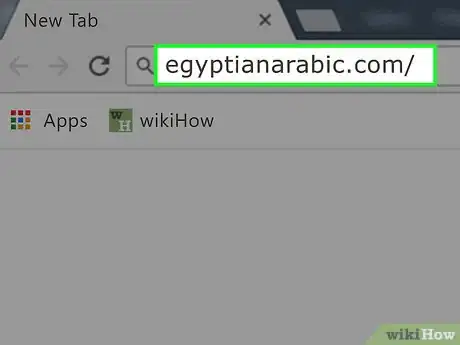
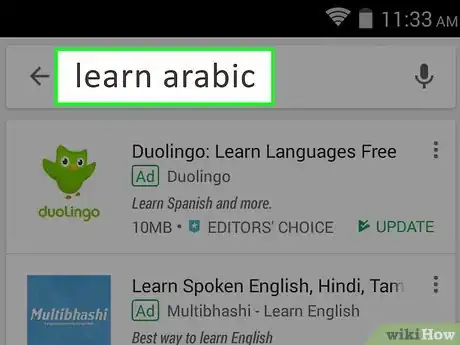


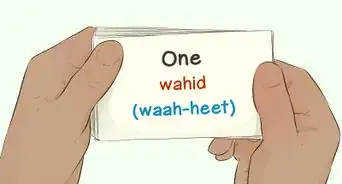


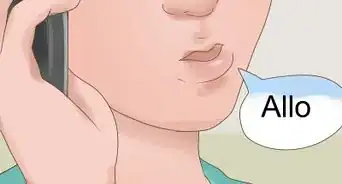



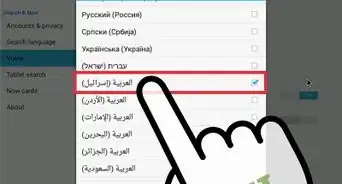

-Step-3-Version-2.webp)








